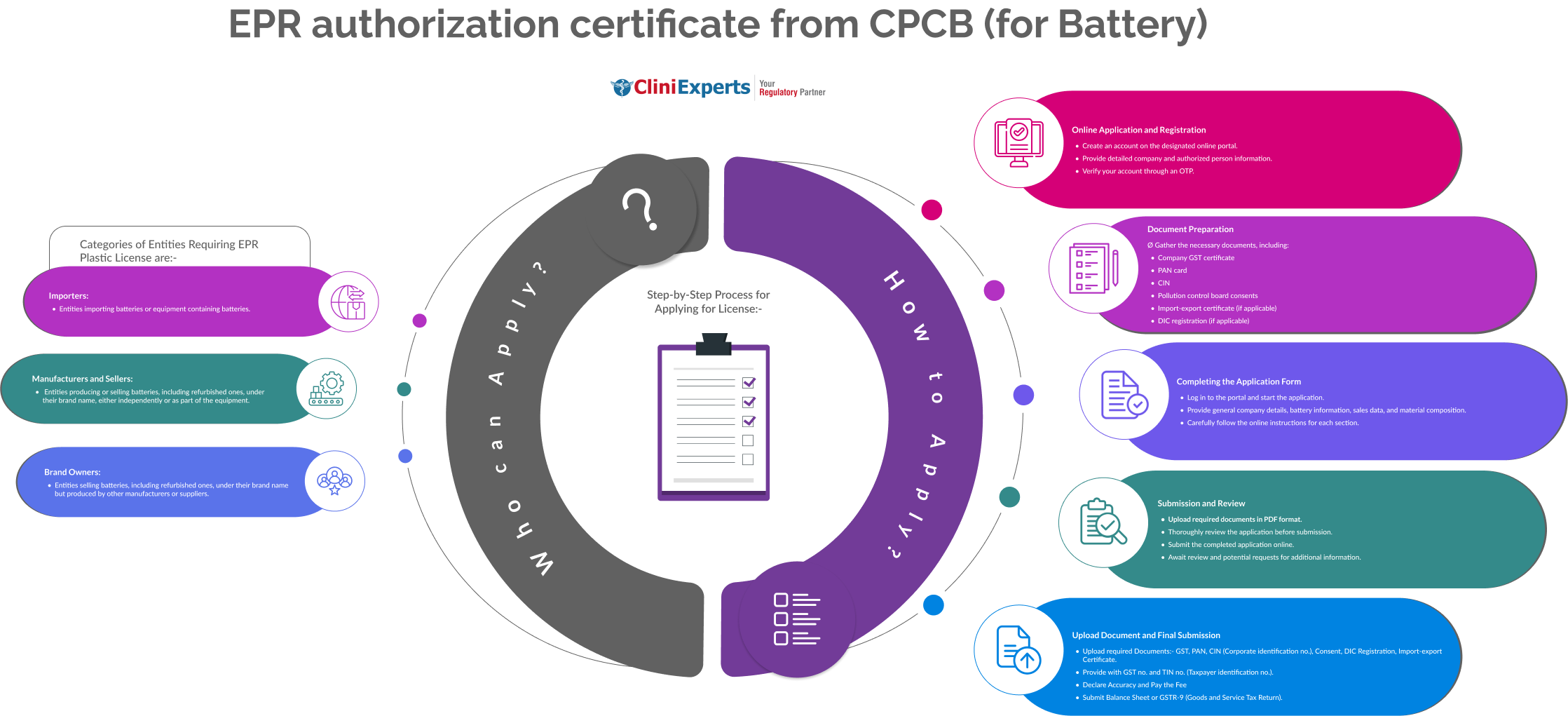EPR authorization certificate from CPCB (for Battery) in India

Navigating India's complex EPR battery regulations, including the submission of Form 1, can be daunting. Let CliniExperts guide you through the entire registration process, ensuring compliance. Our expertise in documentation, recycling partnerships, and regulatory updates will streamline your journey. Avoid penalties and contribute to a greener future with our expert support.
EPR authorization certificate from CPCB (for Battery) – Overview
Who Can Apply?
Categories of Entities Requiring EPR Plastic License are:-
- Importers: Entities importing batteries or equipment containing batteries.
- Manufacturers and Sellers: Entities producing or selling batteries, including refurbished ones, under their brand name, either independently or as part of the equipment.
- Brand Owners: Entities selling batteries, including refurbished ones, under their brand name but produced by other manufacturers or suppliers.

How To Apply?
The Applicant must follow the following process:
-

1. Online Application and Registration: Create an account on the designated online portal. Provide detailed company and authorized person information. Verify your account through an OTP.
-

2. Document Preparation: Gather the necessary documents, including: Company GST certificate, PAN card, CIN, Pollution control board consents, Import-export certificate (if applicable), DIC registration (if applicable)
-

3. Completing the Application Form: Log in to the portal and start the application, Provide general company details, battery information, sales data, and material composition. Carefully follow the online instructions for each section.
-

4. Submission and Review: Upload required documents in PDF format. Thoroughly review the application before submission. Submit the completed application online. Await review and potential requests for additional information.
-

5. Upload Document and Final Submission : Upload required Documents:- GST, PAN, CIN (Corporate identification no.), Consent, DIC Registration, Import-export Certificate. · Provide with GST no. and TIN no. (Taxpayer identification no.). Declare Accuracy and Pay the Fee. Submit Balance Sheet or GSTR-9 (Goods and Service Tax Return). Important: Ensure accuracy, compliance with regulations, and timely submission.

Validity
The EPR Plastic license issued by the Central Pollution Control Board (CPCB) has a validity period of five years. License holders must ensure timely renewal to maintain legal compliance and continue their operations within the prescribed environmental regulations. The entity needs to renew the license 60 days before the expiry of the license. Producers must submit annual reports by June 30th of the following year. Failure to submit all required annual reports will prevent the processing of renewal applications.
Fee Involved
The government fee for obtaining the license varies based on the annual turnover or revenue of the applicant. Businesses with an annual turnover.- below 5 crores must pay a fee of 10,000 rupees.
- For those with a turnover ranging from 5 to 50 crores, the fee is 20,000 rupees.
- exceeding 50 crores are required to pay a fee of 40,000 rupees.
Important Documents

- District Industries Center (DIC) registration certificate.
- Permits for air and water pollution control as mandated by respective Acts.
- Authorization under Hazardous Waste Rules issued by SPCBs/PCCs under the Air/Water Act (if applicable).
- Import Export Code (IEC) certificate (for importers).
- GST certificate of the company Company PAN card.
Timeline to get from Central Drugs Standard Control Organisation
45
DaysEssential Tips
- Accurate Battery Weight Calculation: Only the weight of the battery should be considered for compliance purposes.
- Recycling Partner Selection: Collaborate with a reputable recycler or consider using a third-party service like CliniExperts.
- Timely Annual Returns: Ensure timely submission of annual returns to maintain license validity.
- Portal Issues: The CPCB portal is relatively new, users might encounter technical difficulties such as buffering or slow response times.
Expert Advise
To comply with India's EPR regulations for batteries, producers, importers, and brand owners must register with the Central Pollution Control Board (CPCB).
1. Regulatory Understanding- Deep dive into Battery Waste Management Rules
- Stay updated on regulatory shifts
- Expert navigation of the CPCB portal
- Accurate document preparation
- Strategic target fulfilment planning
- Accurate annual return filing guidance
- Effective recycling partnership facilitation
- Robust data management and reporting
- Building strong industry relationships
- Cost-effective strategies and incentive utilization
Frequently Asked Questions
Who needs to register for EPR?
All producers, importers, and brand owners of batteries in India are required to obtain EPR registration from the Central Pollution Control Board (CPCB).

What is the process for EPR registration?

How long does the registration process take?
The approval process for EPR registration typically takes around 45 working days

What documents are required for registration?
The approval documents required for EPR registration include:
- Company's GST registration certificate.
- Company's PAN card.
- Company's incorporation certificate (CIN).
- Environmental clearances from SPCB/PCC for air and water pollution, and authorization for hazardous waste management.
- Import-export license (if applicable).
- DIC registration (if applicable).

How long is the EPR registration valid?
The EPR registration for battery producers, importers, and brand owners is valid for a period of five years from the date of issuance

What are the recycling targets and responsibilities for registered entities?
Registered entities must meet specific recycling targets as outlined by the CPCB. This involves ensuring proper collection, treatment, and recycling of waste batteries.

